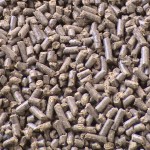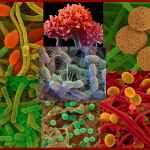What about organic? With more and more products on the store shelves labeled organic, it is clear that these items are increasing in popularity.  But what are some of the key components of these products in regards to fertilizer, are they worth a higher price, and what benefits do they have in the landscape?
But what are some of the key components of these products in regards to fertilizer, are they worth a higher price, and what benefits do they have in the landscape?
To understand organic fertilizers, we need to discuss what they are and are not. Organic fertilizers are usual derived from mineral, animal or plant sources with little processing. Common products would be manure, cotton meal, and seaweed extract. Conversely, synthetic fertilizers are derived through a manufacturing process and are typically more concentrated than organics. Typical products would be urea, ammonium sulfate and potassium sulfate.
 From the perspective of the plant, the plant does not really care if the nutrients are from organic or synthetic sources as long as they are there and readily available to the plant. How the two types become available do differ, however. Synthetic fertilizers are usually encapsulated with a coating that breaks down in the presence of water and becomes available to the plant. Meanwhile, organic fertilizers rely on soil microbes to break down the fertilizer into a form that can be taken up by the plant. Because of these formulation and availability differences, synthetic fertilizers are usually applied at a lower rate to give the same amount of nitrogen. Depending on the product, they are usually more quickly available to the plant but may not last as long. Organic fertilizers are usually applied at higher rates to give the same amount of nitrogen, usually take a little longer to become available to the plant but will be available for a longer time. This usually accounts for the price difference in the products because organics are less concentrated and will need more pounds or product for the same number of square feet as the synthetic.
From the perspective of the plant, the plant does not really care if the nutrients are from organic or synthetic sources as long as they are there and readily available to the plant. How the two types become available do differ, however. Synthetic fertilizers are usually encapsulated with a coating that breaks down in the presence of water and becomes available to the plant. Meanwhile, organic fertilizers rely on soil microbes to break down the fertilizer into a form that can be taken up by the plant. Because of these formulation and availability differences, synthetic fertilizers are usually applied at a lower rate to give the same amount of nitrogen. Depending on the product, they are usually more quickly available to the plant but may not last as long. Organic fertilizers are usually applied at higher rates to give the same amount of nitrogen, usually take a little longer to become available to the plant but will be available for a longer time. This usually accounts for the price difference in the products because organics are less concentrated and will need more pounds or product for the same number of square feet as the synthetic.
Organic fertilizers may contribute some intangible benefits such as feeding soil microbes which in turn create a hospitable environment for roots. Some of the products also provide amino acids and other biostimulants that fit into the organic gardening philosophy of building healthy soils and maintaining healthy plants. By building healthy soils, you create an environment teeming with microorganisms that creates ideal conditions for the plants. This soil containing diverse biological components is likely to promote conditions with improved root development, fewer pest problems, and more drought resistance. Also, since they are broken down more slowly, organics often provide nutrients in a more stable way then the fluctuations of synthetic fertilizers readily breaking down and needing reapplied.
However, both organic and synthetic fertilizers can be harmful to the environment if not used with care. Manure, an organic source, that has not been composted could be as likely to burn plants as an over application of synthetic fertilizer. Also, any fertilizer, organic or synthetic, applied to saturated or frozen soil, has the likelihood to move offsite and affect rivers and waterways. Whether you are using organic or synthetic source of fertilizer, it is important to know about the product you are using and follow the directions provided.
Organic fertilizers are a viable option when buying fertilizer products. Just like their synthetic counterparts, they have their advantages and setbacks. When talking about building and maintaining healthy soils, many of the organic products offer a competitive advantage when compared to their synthetic alternatives. We offer a line of organic turf services as well as organic ornamental fertilization for people who are interested in using these products in their landscape. The products offered in these services are manufactured by Nature Safe, with a line of organic fertilizers, and Holganix, with a line of compost tea based products that inoculate soil with beneficial microorganisms.
